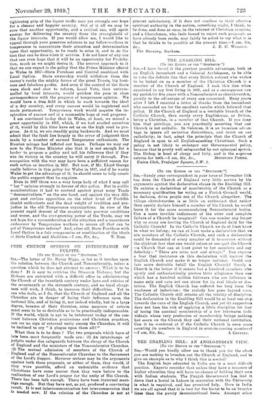FREE CHURCH OPINION ON INTERCHANGE OF PULPITS.
[To THE EDITOR OF THE " SPECTATOR."'
Sre,—The letter of Dr. Davey Biggs, so far as it touches upon the relation between the Church and Nonconformity, raises a question which he does not attempt to answer : What is to be done ? It is easy to criticize the Diocesan Bishops; but the Bishops are entrusted with a difficult office in administering the Church of the twentieth century under laws and rubrics of the seventeenth or the sixteenth century, and no loyal clergy- men will wish, I think, to increase their difficulties. Yet to one who feels, as I do, that the Church of England and all the Churches are in danger of losing their influence upon the national life, and of losing it, not indeed wholly, but in a large degree, because of their disunion, some measure of reform must seem to be so desirable as to be practically indispensable. If the world, which is apt to be intolerant to-day of the con- trast between Christian professions and Christian practices, can see no sign of external unity among the Churches, it will be inclined to cry " A plague upon them all!"
What then is to be done ? The two proposals which have of late been .most frequently made are: (1) An interchange of pulpits under due safeguards between the clergy of the Church of England and the ministers of the Nonconformist Churches. (2) The mutual admission of members of the Church of England and of the Nonconformist Churches to the Sacrament of the Lord's Supper. However serious may be the arguments against both these proposals, or either of them, they would, if they were possible, afford an undeniable evidence that Christians have come nearer than they were before to the realization of our Lord's prayer for the unity of His Church. There has been talk enough. There have been fraternal meet- ings enough. But they have not, as yet, produced a convincing result. It is not intercommunication but intercommunion that is needed now. If the relation of the Churches is not at present satisfactory, if it does not conduce to their effective spiritual authority in the nation, something ought, I think, to be done, and done at once, in the interest of Christian reunion; and a Churchman, who feels bound to reject such proposals as have already been made, may fairly be asked to say what it is that he thinks to be possible at the present time.—I am, Sir,










































 Previous page
Previous page